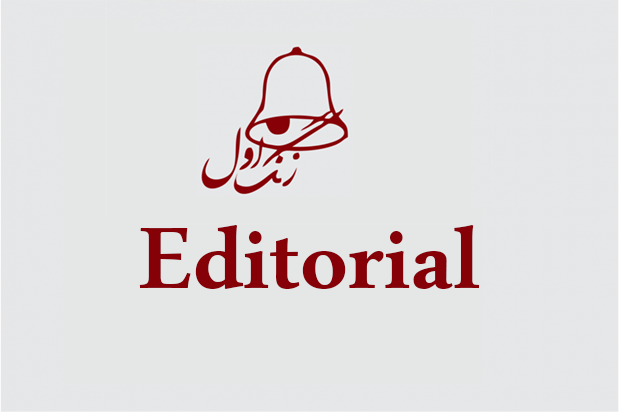Based on the political agreement signed between President Ashraf Ghani and Dr. Abdullah Abdullah on May 19 last year, the former’s share of ministries in the current government’s cabinet was to be twelve ministries. Taking into account the newly established Ministry of Martyrs and the Disabled, this number has reached thirteen ministries. Eleven ministries belong to Abdullah.
Of Ghani’s twelve ministries, four are headed by supervisors. Those in charge of these ministries have not yet received a vote of confidence from the House of Representatives. For about two months now, the Ministries of Information and Culture, Rural Development, Education, and Women have been run by supervisors without being legally approved.
According to the Law on Regulation of the Supervision of Government Ministries and Departments, a candidate who fails to obtain a vote of confidence from the House of Representatives is not eligible to continue as head of a ministry for which he or she has been nominated. Similarly, the term of supervisors in government ministries and departments is set at one month. However, in both cases, Ghani violated the explicit provisions of the Law on Regulation of the Supervision of Government Ministries and Departments. On the one hand, he has retained the nominees who did not win the vote of confidence in the parliament, and on the other, their term of office has lasted more than a month. Also, these very people were in charge of the ministries for months before going to the parliament to get a vote of confidence.
Ghani has also fired the ministers of public health and finance, while four ministries are illegally part of a participatory government in the cabinet. Ahmad Jawad Osmani was fired from the Ministry of Public Health On December 30, 2020, and Abdul Hadi Arghandiwal from the Ministry of Finance on January 23. The Ministry of Public Health has been without a supervisor ever since. In the Ministry of Finance, however, Mohammad Khalid Payainda was appointed as the acting head. Thus, half of the ministries of the Ghani faction do not have a minister.
The reason for Osmani’s dismissal of from the Ministry of Health was corruption in the ministry. The reasons for Arghandiwal’s dismissal from the Ministry of Finance, however, are numerous. One of them was his failure to follow Ghani’s orders.
Arghandiwal acted against Ghani’s expectations and orders in at least three cases. First, he opposed the transfer of the ministry’s revenue, customs, treasury, and budget to the Presidential Palace. Second, Arghandiwal opposed the dismissal of 59 employees of the Ministry of Finance and the director of human resources by Ghani. Third, the dismissed Minister of Finance failed to defend the budget plan for FY 2021 and submit it to the House of Representatives for approval. In this plan, the biggest point of opposition from the MPs is the allocation of funds for the units created by Ghani, in other words, budgetary items from which only the president would have the authority to withdraw money.
Fighting corruption or reforming government offices is one of the slogans that is instrumentalized and used the most politically. Experience has shown that whenever a minister or official does not act according to the wishes of the president or his superiors, he is dismissed under the same slogans. Conversely, for those who have been obedient, such tools are never used to dismiss them. Efforts have also been made to hide their corruption from the public eye and to allow them to flee the country after leaving office.
In the Ghani faction, there are supervisors and ministers accused of dismissals based on ethnicity in their ministries but apparently, the president has not heard about them. These complaints have been very prominent, at least in the Ministries of Foreign Affairs, Education and Mines. It is as though those who complain about the method and political purpose behind the reforms in these ministries are simply wrong and their complaints should be ignored.
Such a dual approach of exposing one minister and hiding the wrongdoings of the other is incorrect. The president must separate his relations with ministers, deputies, heads, and directors of government departments in the fight against corruption and reform. Vindictive and biased approaches will call into question the president’s political honesty. At the same time, implementing reforms in this way and selectively fighting corruption will not bring objective benefits and positive results.
If President Ghani is in favor of working within the law, he must, as a first step, remove the illegal supervisors from his ministries. Following that, he must introduce new nominees to the House of Representatives for a vote of confidence in place of the dismissed ministers. It does not make sense that after almost a month of a minister’s dismissal, no replacement has been introduced and the ministry does not even have a supervisor. If, during the term of the National Unity Government, ministries are to be run by supervisors for months and years, to circumvent the House of Representatives and politically exploit the supervisor position, the future impact of such actions can only be harmful and dangerous. Managing ministries with supervisors reduces the accountability of ministries to parliament and the people to zero. This, in turn, will increase corruption, inefficiency, and weakness in the ministries and subordinate departments. Therefore, the shaky cabinet founded by Ghani must be pursued within the framework of the law and the principles and national interests of the country. This shaky cabinet must be free from any political motives with the sole purpose of improving affairs and ensuring public wellness.











